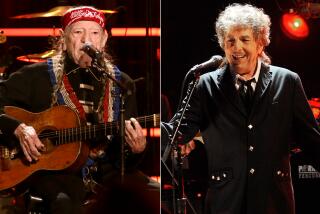STAGE : The Simon Boys: A Tale of Two Brothers
- Share via
They are as alike and unalike as brothers can be. The smiles are the same, the noses too. The younger one, Neil, is taller, calmer, more reserved. Danny is chattier, almost ebullient. Neil speaks more slowly, reflectively; his pronouncements are often wry. Danny is grudging about his age: “I have to lie, because I’m single.” Neil, 60, gently plays along: “Whatever the age difference. . . .” Danny is divorced; Neil is married. Danny lives in Sherman Oaks, Neil in Bel-Air. Danny is a respected comedy writer and director. Neil is the most successful playwright of our time.
On Wednesday, Neil Simon’s “Broadway Bound” opens at the Ahmanson. The last of an autobiographical trilogy (preceded by 1983’s “Brighton Beach Memoirs” and 1985’s “Biloxi Blues”), “Broadway Bound” finds young Eugene Jerome and his brother leaving the family homestead and setting off to write TV comedy together.
Interviewed recently at Neil’s Westwood office, the Simon boys admitted there are disparities in their childhood memories.
“There’s a different perspective,” said Neil (born Marvin Neil Simon). “You’re different people, and you’re treated differently by your parents. I never had a younger brother. He never had an older brother.”
Added Danny: “So much of what I remember was protecting him.” (He still bears a broken finger, received shielding baby Neil from a hurtling baseball. He also fondly recalls Neil’s many childhood nicknames--”Shrimp,” “Shorty” among them.) “Our parents always had their problems, and we had those two little twin beds and I’d lean across them and say, ‘Don’t worry. Someday we’ll grow up and be out of this.’ ”
“Danny was like an idol to me,” Neil said. “He was a good baseball player and he played basketball. He was way ahead of me in all of those things. So I looked up to him. I loved it when he and his friends would take me places, because I was just this little kid. When we got older, Danny assumed the role of leader in going for interviews. He did all the things I’d be too shy to do. So when Danny and I broke up later and I was going for jobs on my own, it was very hard.”
As a team, the brothers wrote material for Buddy Hackett, Jan Murray, Red Buttons, Dick Shawn and Phil Silvers--plus “The Jackie Gleason Show” and “The Milton Berle Show.” Yet in 1956, Neil decided to go solo.
“I had gotten married,” he said simply. “I needed to be my own person. And I didn’t want to be a partner anymore, maybe because I now had a different kind of partner in my life. So we split up.”
In spite of that, Danny was never far from his brother’s work--at least in spirit.
Neil’s first play, “Come Blow Your Horn” (1961), was, he notes, “about our family, but in the farcical sense. I was afraid of how my father would take it. Afterwards, he said, ‘Gee, I know so many men just like that.’ He never saw himself.
“But Danny always saw himself. In ‘The Odd Couple’ (based on Danny’s rooming experiences with agent Roy Gerber), Danny wasn’t necessarily the prissy one--or the slob. It’s just that I needed two contrasting characters, and the man he was living with was infinitely sloppier. And Danny was the cook, preparing meals for the girls they’d double-date.”
In “Chapter Two” (1977), Danny was back, fixing up his widowed brother “with a crazy girl with crazy hair and a crazy name. The truth is, I fixed him up with a very lovely girl. But that wouldn’t have been funny. After a while, I think he starts to believe the made-up version.”
Neil nodded. “You try to go back in your mind and think, ‘What is the truth and what isn’t the truth?’ Often you don’t know if it’s your memory of the real truth--or your writer’s memory, which distorts the truth almost as it comes into your mind.”
Danny hasn’t minded being a Neil Simon character. But the title of “Neil Simon’s brother” is another matter. “Sure, I resent--not Neil, but not having a name of my own. I have an identity. I’m Danny Simon, who happens to be Neil Simon’s brother.”
Recently, Danny’s activities have included lecturing nationally at schools and organizations as part of the Program Corp. of America. Proud though he is of that, there are still career regrets:
“I wish I’d gone further with directing. (His credits include “The Carol Burnett Show” and stage productions of “The Sunshine Boys” and “Plaza Suite.”) I’d rather direct than do anything in the world, except have sex.”
Quips Neil, “And if he could direct while having sex. . . .”
Danny sighed. “Many people would give anything to have my career. It’s just that when you put it in perspective with Neil’s. . . .”
Even as a child, Danny recalls coming up short by comparison: “Because I stood up to my father, he resented me. And he turned a lot of the love he had for me towards Neil. He’d say, ‘You’ll never be like the little one. The little one has more talent in his pinky than you have in your whole body.’
“Later, when I lost a lot of work--attacking producers, walking off high-paying jobs--I wonder if subconsciously I was saying to my father, ‘OK. You said I wasn’t going to be anything. That’s what you want, that’s what you get.’ ”
Neil has not been immune to his brother’s pain. “When he would tell me the jokes about being Neil Simon’s brother--I didn’t enjoy them. I felt guilty. Finally, I thought, ‘It’s no longer my responsibility. It’s Danny’s life, and he has to deal with that problem.’ ”
Neil attributes his own success to a deeply entrenched work ethic. “Something must have happened to me in my childhood to make me become as prolific as I’ve been (23 plays--plus two new unproduced ones--and 19 movies, including the newly released and very successful “Biloxi Blues”), to be hungry all the time, always wanting to do better. Somewhere I learned that discipline. Danny was always very disciplined, about when I had to go to bed--or ‘Come on, we have to work.’ I’d say, ‘Let’s play golf.’ And he’d say, ‘OK, we’ll play golf, but we have to work while we play.’
“In some ways, I rebelled, but when it came down to it, there was such a need to achieve. It wasn’t success; it was to be good at what you did. So it was really Danny who created the monster. When I was 15, he was saying things like, ‘You’re going to be the greatest comedy writer in the world.’ Not ‘You’re going to be very good someday.’ So he’s responsible.”
As for the public seeing Neil himself in the work, “They only think they do,” he said dryly. “You tell about one-tenth of what is really true. When I was writing a play about my daughter Nancy and me, someone asked her if it bothered her that I was writing about us. She said, ‘No, because it’s his perception--and not necessarily the truth.’ ”
By now, it seems, everyone in Neil’s life has adjusted to his status--and theirs. Danny swears he wouldn’t change places with his brother. “My clothes wouldn’t fit,” he said merrily. “The thing is, he’s not outgoing; his life style is comparatively modest. I think I would’ve become a big (jerk) if his success had happened to me. If I had to be him, I’d go insane.”
Neil hasn’t always dealt so well with his celebrity. “It’s partly savvy, partly neurosis,” he says of the public coping. “Sometimes you go to bed at night and there’s a huge spotlight shining on you--and you can’t turn it off. Sometimes you want to say, ‘ Go away .’
“The thing that’s given me balance has been my marriages: the first to Joan, which lasted 19 years. Then I had 10 really good years with Marsha (Mason) till that ended. I’d always look to get married again, because it’s home for me. Now we (new wife Diane Lander) have a little girl, so that equalizes everything else. That’s normality.
“But things like walking around Westwood--I hate it. I can’t go into a restaurant or bookstore without hearing a buzz: ‘ That’s Neil Simon .’ Before this happened, I used to go to New York City, go into a luncheonette, sit at the counter and listen to the conversations around me. Be anonymous, an observer. Then I became the observed.”
Although he’ll probably never stop writing plays (“Why should I? It’s what I do”), Neil acknowledges that the autobiographical material has probably come to an end. He is, however, looking forward to staging his new plays in a less-pressured setting. The “soul-searching” “Jake’s Women” will premiere this fall at San Diego’s Old Globe and his “all-out farce” “Rumors” will bow at Duke University in January, 1989.
“I realize more and more the toll this all takes on me. Going to New York, all that I’ve gone through these last two weeks with ‘Biloxi,’ all the interviews--being so careful of what you’re saying. It makes the mind work a lot harder than it does when you’re writing.”
As for Danny, he’s much mellower than he used to be. “You live long enough and get to be wise,” he shrugged. “I’ve found that being Neil Simon’s brother has its own joys. A reflected glory. I feel I’ve contributed to what he is.”
Anyway, it’s all in the family. “When we split up, we agreed to divide everything evenly. So I took the sofa, he took the stationery, I took the desk, he took the typewriter. If I’d taken the typewriter, I could’ve written all those plays.”
More to Read
The biggest entertainment stories
Get our big stories about Hollywood, film, television, music, arts, culture and more right in your inbox as soon as they publish.
You may occasionally receive promotional content from the Los Angeles Times.










